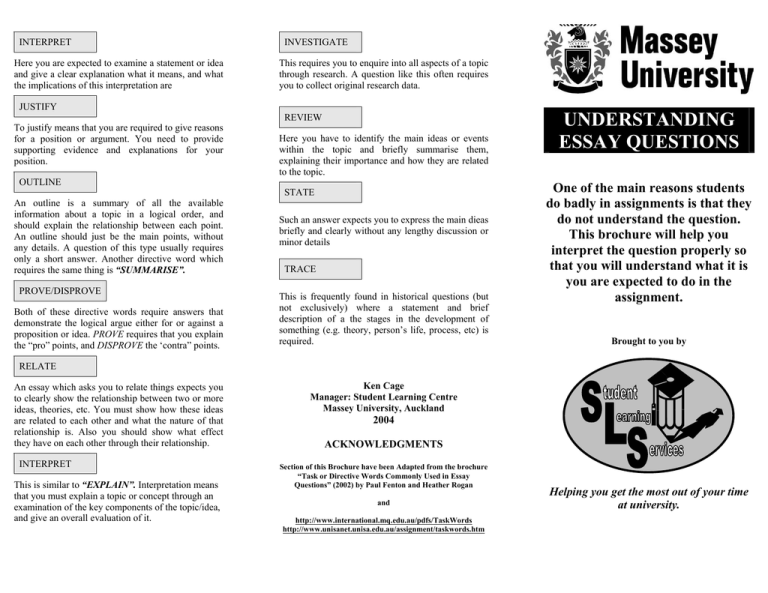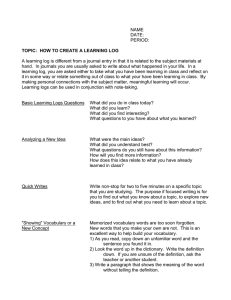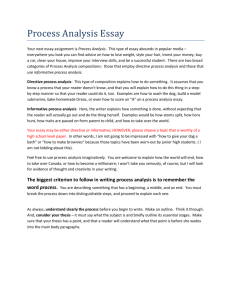understanding essay questions
advertisement

INTERPRET Here you are expected to examine a statement or idea and give a clear explanation what it means, and what the implications of this interpretation are INVESTIGATE This requires you to enquire into all aspects of a topic through research. A question like this often requires you to collect original research data. JUSTIFY To justify means that you are required to give reasons for a position or argument. You need to provide supporting evidence and explanations for your position. OUTLINE An outline is a summary of all the available information about a topic in a logical order, and should explain the relationship between each point. An outline should just be the main points, without any details. A question of this type usually requires only a short answer. Another directive word which requires the same thing is “SUMMARISE”. PROVE/DISPROVE Both of these directive words require answers that demonstrate the logical argue either for or against a proposition or idea. PROVE requires that you explain the “pro” points, and DISPROVE the ‘contra” points. REVIEW Here you have to identify the main ideas or events within the topic and briefly summarise them, explaining their importance and how they are related to the topic. STATE Such an answer expects you to express the main dieas briefly and clearly without any lengthy discussion or minor details TRACE This is frequently found in historical questions (but not exclusively) where a statement and brief description of a the stages in the development of something (e.g. theory, person’s life, process, etc) is required. UNDERSTANDING ESSAY QUESTIONS One of the main reasons students do badly in assignments is that they do not understand the question. This brochure will help you interpret the question properly so that you will understand what it is you are expected to do in the assignment. Brought to you by RELATE An essay which asks you to relate things expects you to clearly show the relationship between two or more ideas, theories, etc. You must show how these ideas are related to each other and what the nature of that relationship is. Also you should show what effect they have on each other through their relationship. INTERPRET This is similar to “EXPLAIN”. Interpretation means that you must explain a topic or concept through an examination of the key components of the topic/idea, and give an overall evaluation of it. Ken Cage Manager: Student Learning Centre Massey University, Auckland 2004 ACKNOWLEDGMENTS Section of this Brochure have been Adapted from the brochure “Task or Directive Words Commonly Used in Essay Questions” (2002) by Paul Fenton and Heather Rogan and http://www.international.mq.edu.au/pdfs/TaskWords http://www.unisanet.unisa.edu.au/assignment/taskwords.htm Helping you get the most out of your time at university. INTRODUCTION Answering essay questions can cause problems for most students. It may be that the topic you are expected to write about is extremely difficult to understand. However, most times it is the question itself which is a source of confusion. Essay questions usually contain TASK or DIRECTIVE words. These direct the writer to answer the question in a particular way. This brochure will introduce you to the key task words which are often used in essay questions. Knowing what these words mean will assist you in answering the question which has been set. TASK/DIRECTIVE WORDS Task/directive words, as the name implies, give you directions as to what task is expected of you. Below is a list of the most common task/directive words, along with their meanings. ACCOUNT FOR You are expected to give reasons for something, or explain why something has occurred. ANALYSE You are expected to take an idea, concept or statement apart and examine the elements of which it comprises. Your answer should be methodically and logically organised. ARGUE This question requires you to present a case for and/or against a concept or situation. ASSESS/EVALUATE This involves you making a judgment about an idea or a topic. After acknowledging the points for and against the idea, you need to state, with reasons, whether the topic/idea being discussed is valid or not. Your judgment should be based on other author’s views on the subject, as well as your own opinion of the merits of the idea/subject. COMMENT ON This type of question expects you to state your opinion on a topic, situation or idea. Your opinion should be informed by your reading. COMPARE DESCRIBE Here a simple description of the attributes or characteristics of a topic or idea must be give. A definition answer must include a discussion of the concept and should also state the limits of the idea being defined. DISCUSS Here the answer must explain a topic or concept, and then give details through supporting evidence, examples, points for and against, and explanations for the facts put forward from various points of view. This can be one of the most difficult types of essay questions. EXAMINE Here you must set items/ideas side by side to show their similarities and differences. A balanced, fair and objective answer is expected. You are not expected to give your opinion. CONTRAST Here you are expected show only the differences between two or more topics/ideas/etc. You must investigate or inspect closely, and give an opinion on your observation. EXPLAIN You must show how or why something happens, or is constructed in a particular way. The explanation should increase the reader’s understanding of the topic or idea. HYPOTHESISE CRITICISE This answer requires you to point out flaws or weaknesses in an argument/idea, but also you are expected to indicate any positive aspects of the subject in question. Your answer must not be biased, and should give a balanced answer. Any decision or judgment you may make must be supported with evidence. Sometimes the directive words used are: CRITICALLY EXAMINE DEFINE A definition of something means that your answer must explain the precise meaning of something. A hypothesis is a theory which is confirmed or rejected through testing. This type of question requires you to give reasons for, and explain why an event occurs. ILLUSTRATE Such an answer consists mainly of examples which demonstrate or prove the subject of the question. Another directive word will usually be included in the question.

